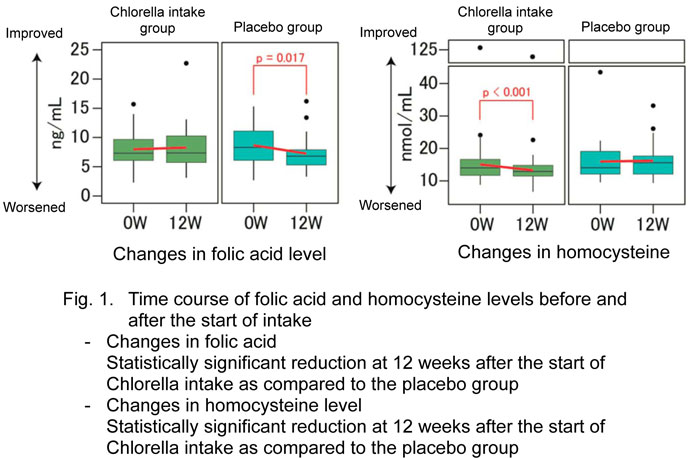- TOP
- List of reports
- Effects of Chlorella on Diabetes Precursor Population: Findings from Metabolome Analysis
in Placebo-Controlled Randomized Clinical Trial
Effects of Chlorella on Diabetes Precursor Population: Findings from Metabolome Analysis in Placebo-Controlled Randomized Clinical Trial
【Scientific information】
Research and Development Department, Sun Chlorella Corporation

Effects of Chlorella on Diabetes Precursor Population: Findings from Metabolome Analysis in Placebo-Controlled Randomized Clinical Trial
Presented at the 35th General Conference of the Japanese Society of Clinical Nutrition (2013)
This presentation was awarded the Young Researcher Encouraging Prize for the method and plan of the study designed for evaluation of Chlorella efficacy appraised by the examiners in the Science and Presentation Section of the Conference.
- Objectives
- The number of patients with type 2 diabetes mellitus has been increasing across the world. It is known well that progression of type 2 diabetes mellitus increases the risk for complications such as arteriosclerosis , nephropathy and dementia. The present study, designed as a placebo-controlled randomized clinical , was conducted to examine changes seen following Chlorella intake by humans rated as type 2 diabetes mellitus precursors.
- Methods
- Sixty male adults rated as type 2 diabetes mellitus precursors ((HbA1c*1: 6.0-6.4%) were divided into two groups: the group taking Chlorella sapplement(n=30) and the group taking placebo sapplement food (particles of the same form free of Chlorella; n=30). The sapplement intake period was 12 weeks. In both groups, hematological test was conducted before and 4, 8, 12 and 16 weeks after the start of intake and special blood test and metabolome analysis*2 were performed before and 12 weeks after the start of intake. Changes in the substances in blood were analyzed.
- Results
- Metabolome analysis revealed improved fatty acid metabolism and alleviation of oxidative stress in the Chlorella intake group.
- In the Chlorella intake group, total cholesterol level at 4 weeks was significantly lower than the pre-intake level (p=0.029). In addition, the level of folic acid (a vitamin B known to have antioxidant activity) elevated and the level of homocysteine (associated with the onset of atherosclerosis, cardiovascular disease and dementia) significantly decreased (p<0.001, Fig. 1). Folate is known to reduce blood homocysteine level.
- Thus, intake of Chlorella resulted in improvement of fatty acid metabolism and alleviation of oxidative stress. Progression of precursory condition to type 2 diabetes mellitus is known to aggravate fatty acid metabolism and to elevate oxidative stress. So, intake of Chlorella is expected to suppress the progression to type 2 diabetes mellitus in precursory people. In addition to the effects on diabetes study-report 2 mellitus, other extensive effects (e.g., prevention of anemia, arteriosclerotic cardiovascular disease, cerebrovascular disease and dementia) may be expected of Chlorella intake which increases folic acid and reduces homocysteine. These diverse effects of Chlorella seem to be attributable to the numerous nutrients contained in Chlorella, working in an interacting and complementary fashion and allowing gentle adjustment of balance in the living body. Chlorella is a food and its components after taken up into the living body undergo metabolism similar to other foods. So, continued intake of Chlorella is expected to allow individual to enjoy the benefits of Chlorella.

Terminology
- *1: HbA1c
- This parameter reflects the mean blood glucose level during the past 1-2 months
and is used for diagnosis of diabetes mellitus. An HbA1c level of 6.5% or higher
strongly suggests the risk of diabetes mellitus.
Source: Leaflet prepared by the Japan Council for Promotion of Anti-Diabetes Measures
- *2: Metabolome analysis
- A technique capable of sensitively detecting substances formed during life activities (metabolism) in a specific range (up to about 1,000 of molecular weighs) in a collective manner. Conditions very nearly to illness (e.g., precursory type 2 diabetes mellitus) often show no marked change in blood test and are difficult to judge on the basis of conventional blood tests alone. This technique enables detection of minute changes in substances contained in blood and is thus promising as a new measure of evaluation.
Details
- Professional: society meeting
- 35th General Conference of the Japanese Society of Clinical Nutrition (2013)
- Title:
- Effects of Chlorella on Diabetes Precursor Population: Findings from Metabolome Analysis in Placebo-Controlled Randomized Comparative Study
- Authors:
- Masaki Fujishima2), Hiroshige Itaura1), Hideo Takekoshi2), Hiroshi Naoki2)
- Affiliation:
- 1) Ibaraki Christian University, 2) Sun Chlorella Corporation





